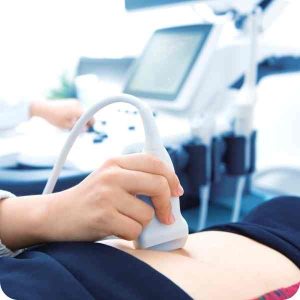Whether it’s your first baby or your third, that first flutter is too precious. Soon enough tiny baby movements turn into fully fledged kicks. Every organ within reach is at the mercy of little elbows, hands, and knees. While it can get uncomfortable at times, generally, an active baby is a healthy baby. Their heightened movement is a good indication that they are growing in size and strength.
Monitoring your baby’s movement is important. A drop in their usual activity level can indicate that something is not right. In that case you must be in touch with your midwife straight away. With the expert advice of Catriona Grech, one of the midwives at MyMama, in this article we share how to effectively track your little one’s movement, as well as when to seek help.
At which point in the pregnancy should I expect to feel the baby move?
 It depends if this is your first pregnancy or not. Many first-time mums only become aware of their baby’s movement at around 18 to 20 weeks, sometimes later. If you’ve been pregnant before, you can start feeling movement as early as the 16th week of pregnancy. This can feel like a kick, flutter, a swish or a roll and it may change as you move further along the pregnancy.
It depends if this is your first pregnancy or not. Many first-time mums only become aware of their baby’s movement at around 18 to 20 weeks, sometimes later. If you’ve been pregnant before, you can start feeling movement as early as the 16th week of pregnancy. This can feel like a kick, flutter, a swish or a roll and it may change as you move further along the pregnancy.
Baby activity
“Afternoons and evenings are usually times of peak activity for babies”, explains Catriona. “During the day and the night, your baby has sleep periods which can last between 20 and 40 minutes and up to a maximum of 90 minutes.” Babies do not usually move while sleeping.
The number of times the baby moves increases as the pregnancy progresses to 32 weeks and then stays the same. Although, the type of movement may feel different as you get closer to your due date.
“If you’re busy, you may not notice all movements,” says Catriona, “however it’s important to continue feeling the baby move until you’re in labour and during it, too”.
Why are my baby’s movements important?
Your baby’s movements are an indication of his or her wellbeing. “If you feel that your baby is moving less than usual, or notice a change in their pattern, it is very important that you contact the labour ward, your midwife, or your obstetrician immediately”, emphasises Catriona. A change or reduction in movement may be a sign that your baby is unwell and they will need to be assessed.
How often should my baby move?
Every baby is different, so there’s no specific number of movements you should be feeling. The most important thing is that you know your baby’s day to day movements and that you seek help if you notice a reduction or change.
Is there anything that can affect being able to feel my baby move?
Catriona explains that there are a number of factors that can affect how often you feel your baby move:
- How active and busy you are: you may be less aware of their movements while busy
- The location of your placenta: if your placenta is at the front of the womb, then it’s harder to feel movement
- How your baby is lying – If your baby is lying with his or her back to the front of your uterus you may feel fewer movements than if his or her back was lying alongside your own back.
“It doesn’t matter if your baby is lying head down or bottom first though – this will not affect whether or not you can feel them move”, notes Catriona.
What can cause my baby to move less?
 There are many factors that may affect your baby’s movement. The first is how and when you perceive movement rather than how much your baby is moving. “There is some evidence that mums-to-be feel most foetal movements when lying down, rather than when sitting or standing”. When you pay close attention to your baby’s movements you can point them out more clearly. However, there are some other factors that don’t rely on how attuned you are to your little one’s movement. One of these is drugs, such as pain relief or sedatives. These can get into the baby’s circulation, reducing their movement. Alcohol and smoking, too, can affect your baby’s movements.
There are many factors that may affect your baby’s movement. The first is how and when you perceive movement rather than how much your baby is moving. “There is some evidence that mums-to-be feel most foetal movements when lying down, rather than when sitting or standing”. When you pay close attention to your baby’s movements you can point them out more clearly. However, there are some other factors that don’t rely on how attuned you are to your little one’s movement. One of these is drugs, such as pain relief or sedatives. These can get into the baby’s circulation, reducing their movement. Alcohol and smoking, too, can affect your baby’s movements.
Less likely but possible is that your baby may move less because they’re unwell. In rare cases, a condition affecting the baby’s muscles or nerves may be the reason behind little movement or none at all.
What can I do to make the baby move?
 Catriona suggests some tried and tested tips to encourage the baby to move:
Catriona suggests some tried and tested tips to encourage the baby to move:
- Lie down or change sides: try lying down if you’ve been standing or sitting for long, or change sides if you’re already lying down
- Snacking: eat a piece of chocolate and monitor your baby’s movement. The spike in blood sugar can get them moving
- Drink: a glass of cold water or milk can encourage movement
- Caffeine (in moderation): you should be conscious of your coffee intake during pregnancy (the Royal College of Midwives recommends that pregnant women consume no more than 200 milligrams of caffeine per day), but if you haven’t had your daily cup yet, some coffee can have the same effect as sugar on your baby.
- Gentle nudging: if you feel like their back or tiny bottom is pressed against your stomach, put some gentle pressure and see if they respond back. Sometimes, a gentle nudge is all it takes for them to react.
Can my baby move too much?
While it’s not likely that your baby can move too much, some studies did find that an elevation in glucose concentration in maternal blood led to an increase in foetal movements.
Again, the important thing is that you’re aware of your baby’s usual pattern and conscious of any changes. If you do notice any changes, you should get in touch with your midwife or obstetrician.
Should I use a chart to track my baby’s movements?
While we may have heard of charting baby’s movements, Catriona notes that there is not enough evidence to recommend the routine use of a movement chart: “The important thing is to be aware of your baby’s individual pattern of movements throughout your pregnancy and to seek immediate help if you feel that the movements are reduced or changed”.
What should I do if I feel my baby’s movements have changed or reduced?
 “Always seek professional help immediately”, emphasises Catriona. “There are staff 24 hours a day, 7 days a week. DO NOT put off calling until the next day to see what happens.” It is important for midwives to know if your baby’s movements have slowed down or stopped and never rely on any home kits you may have for listening to your baby’s heartbeat.
“Always seek professional help immediately”, emphasises Catriona. “There are staff 24 hours a day, 7 days a week. DO NOT put off calling until the next day to see what happens.” It is important for midwives to know if your baby’s movements have slowed down or stopped and never rely on any home kits you may have for listening to your baby’s heartbeat.
Once you report reduced movement, Catriona explains that the care you receive depends on how far along you are in your pregnancy:
Less than 24 weeks pregnant: contact your midwife/obstetrician if you haven’t felt your baby move by 24 weeks. They will check your baby’s heartbeat and an ultrasound scan may be arranged to check on the baby’s development.
24 – 28 weeks pregnant: A midwife or obstetrician will check your baby’s heartbeat and a full antenatal check up will follow. This includes measuring your blood pressure, testing your urine, and checking the size of your uterus. An ultrasound scan may be arranged to check on your baby’s growth and development.
Over 28 weeks pregnant: Contact your midwife/obstetrician or delivery suite immediately – do not wait until the next day to seek help. You will be asked about your baby’s movements and undergo a full antenatal check-up. Your baby’s heart rate will be monitored for at least 20 minutes using cardiotocograph monitoring. You should be able to see your baby’s heart rate increase as he or she moves. An ultrasound scan may be arranged to check on your baby’s growth and development. This assessment usually includes a look into the baby’s abdominal circumference, their estimated fetal weight, and amniotic fluid levels. This allows your obstetrician to determine if the baby’s gestational age matches how far along you are. Once reassured, you will be discharged home. Most mums-to-be who experience one episode of reduced movement go on to have a straightforward pregnancy and a healthy baby.
Can I use a home doppler to check on my baby?
As already noted, do not use any hand-held monitors or phone apps to check your baby’s heartbeat. Catriona explains that it is very easy to confuse your own heartbeat with the baby’s and be falsely reassured. Additionally, it is very hard to listen to a baby’s heartbeat in the first trimester and the first part of the second trimester, which may cause you unnecessary stress. Monitoring your baby’s movements is definitely the best way to keep an eye on the baby’s well being.
If the movements have slowed down does it mean my baby is unwell?
“Fewer movements could mean that your baby is unwell, but usually these checks reveal that everything is OK,” says Catriona. “That said, it is very important that you take action and get checked to make sure everything is well.”
What if I experience another episode of reduced foetal movement?
When you’re discharged, you will be advised to keep an eye on your baby’s movements and, should your baby have another episode of reduced movements, you must again contact your obstetrician, midwife or labour ward for advice, even if everything was OK last time. As Catriona emphasises, “Never hesitate to contact us for advice, no matter how many times this happens”.
The Takeaway
Your baby’s movements are an indication of their well being. You should always contact the maternity ward, midwife or obstetrician if you notice a reduction or change in your baby’s movements.



